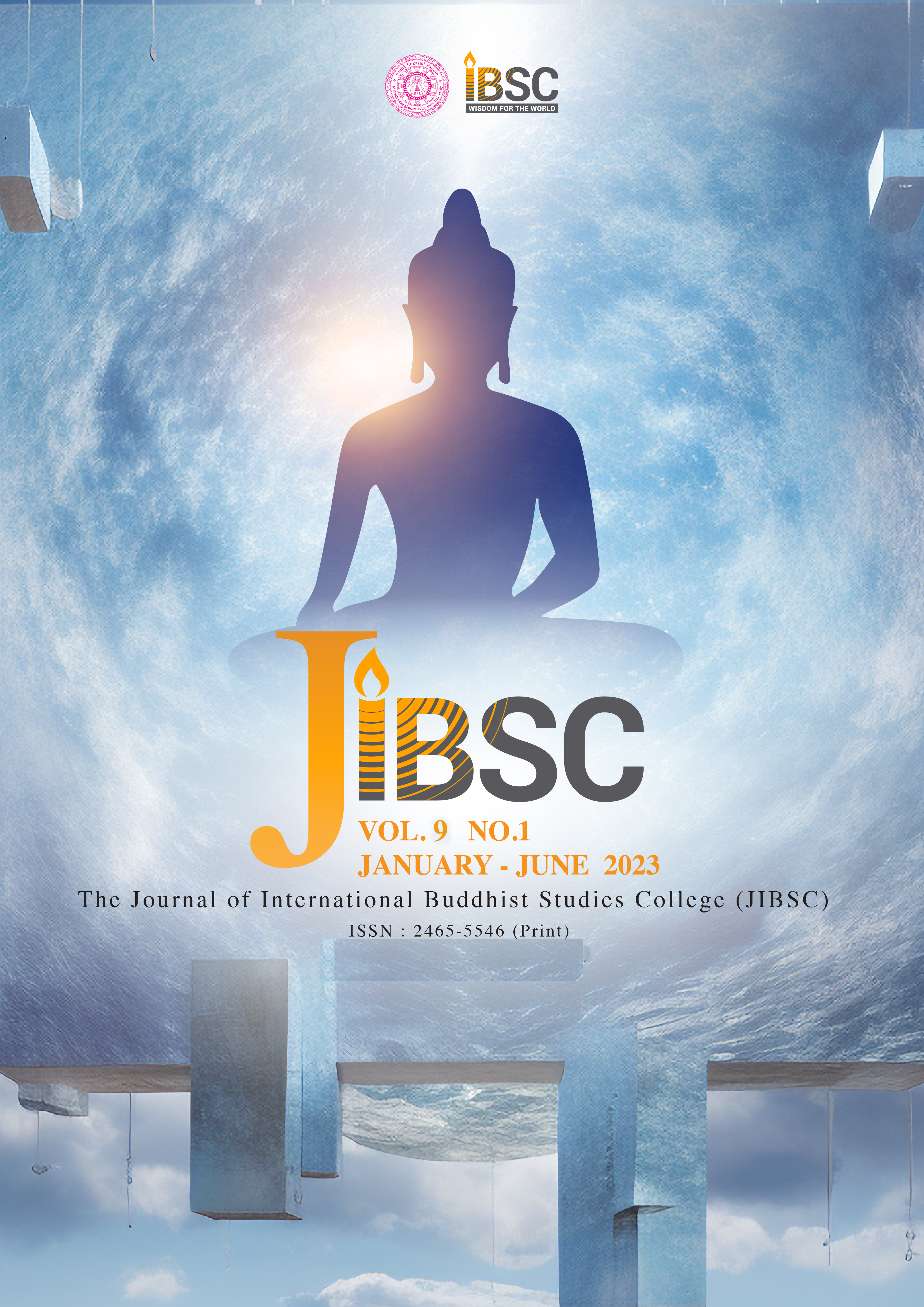A Study of Proper Saṅgha Dāna in Theravada Buddhism: A Study Based on Thai Buddhist Monks
Main Article Content
Abstract
This research article wrote with 3 objectives in mind, namely 1) To examine the problems and impacts of Saṅgha Dāna in Thailand, 2) To examine the concept of Saṅgha Dāna in Theravada scriptures, 3) To present the proper Saṅgha Dāna for Buddhist Monks in Thailand. The finding shows various problems and impacts that aren’t so difficult or complicated to solved if Thai Buddhists society pay attention and willing to co-operate. The original teaching on Saṅgha Dāna practice in the Tipitaka is found to be the offering given to group of the Ariya monks (the 4 pairs of individuals, the Stream Enterer for instance) of at least 4 members. However, with the right intention and appointing, it is merely the Dāna offering for the sake of Saṅgha even though the offeror only give to a single monk or appointed individual. The results founded have been used to present the ideal
proper Saṅgha Dāna for the contemporary Thai Buddhist society in the following categories. Proper materials for Saṅgha Dāna must be consumableand good quality. Proper monks must be ariya (noble) monks of at least 4 members, otherwise the monks should at least complete with vijjā carana sampanno (endowed with perfect clear vision and exemplary good conduct). Proper offeror should have a good virtue and characteristics. The proper occasion to offer Saṅgha Dāna is the monks are visiting, leaving, ill, goods are hard to get and still fresh and new. Proper understanding is when realized that most of the modern days Saṅgha Dāna practices are not what originally taught by the Buddha.
Article Details
The Journal of TCI is licensed under a Creative Commons Attribution-NonCommercial-NoDerivatives 4.0 International (CC BY-NC-ND 4.0) licence unless otherwise stated. Please read our Policies page for more information on Open Access, copyright and permissions.
References
Academic Division of Dhammakaya Open University. The Fundamental of Different Religions DF 404. California: Dhammakaya Open University, 2007/2550 B.E.
Bodhi, Bhikkhu (tr.). Saṃyutta Nikāya [The Connected Discourses of the Buddha]. vol 2. Oxford: PTS., 2000.
Bodhi, Bhikkhu (tr.). Saṃyutta Nikāya [The Connected Discourses of the Buddha]. vol 1. Oxford: PTS., 2000.
Burlingame, Eugene Watson (tr.). Dhammapada Commentary [Buddhist legends]. Translate from the original Pāli text. Translation of Book 13-26. Massachusetts: Harvard University Press, 1921.
Department of Religious Affairs Ministry of Culture. Happy merit creating need to pay attention to Saṅgha Dāna’As label. Bangkok: Dhamma in Trend, 2015.
Frost Gary; Dornhorst, Anne; and Moses, Robert (ed.). Nutritional Management of Diabetes Mellitus. London: Wiley, 2003.
Hare, E. M. (tr.). Anguttara Nikāya [The Book of the Gradual Sayings]. vol 3. London and Boston: PTS., 1973.
Hare, E. M. (tr.). Anguttara Nikāya [The Book of the Gradual Sayings]. vol 4. London Henley and Boston: PTS., 1978.
Horner, I. B. (tr.). Vinaya Pitaka [The Book of Discipline]. Vol 2. London: PTS., 1969.
Horner, I. B. (tr.). Vinaya-Pitaka [The Book of Discipline]. Vol 4. London: Luzac & Company Ltd, 1971.
Kanrayānasitthivat, Phrakrū. In-Depth Important Days of Buddhism. Bangkok: MCU Press, 2014.
Kanyārat Reunjai, CPB investigation of “Pseudo Saṅgha Dāna” found unqualified and useless goods. Innnews, https://www.youtube.com/watch?v=q3l7DERh38Q#action=share (accessed January 8, 2021).
Medical and Nutrition Experts from Mayo Clinic. Encyclopedia of Foods: A Guide to Healthy Nutrition. California: Academic Press, 2002.
Ministry of Public Health. Good health start at reduced sweetie, oily, salty food, and filled with fruits and vegetable. Bangkok: Nutrition Promotion Group, 2017.
Ministry of Public Health. How to buy and wash fruits and vegetables so they are safe and clean. Bangkok: Agricultural Cooperative Community, 2014.
Ñāṇamoli, Bhikkhu; Bodhi, Bhikkhu (trs.). Majjhima Nikāya (The middle length discourses of the Buddha). Oxford: PTS., 1995.
Phōmmalūesī, Sanchai. Saṅgha Dāna. Bangkok: Dhamma Club, 1997.
Pimtent99. “What is the meaning and origin of Saṅgha Dāna?”, Online Article, https://www.shopat24.com/blog/trending/what-is-the-meaning-of-sangkhathan/ (accessed January 12, 2021).
Sangsinchai, Thongyoy. Right way to offer Saṅgha Dāna. Bangkok: Dwuangkaew Press, 1999
Tankaew, Boonmee. Tradition and Ceremony of Buddhism. Bangkok: Audience store, 2004.


